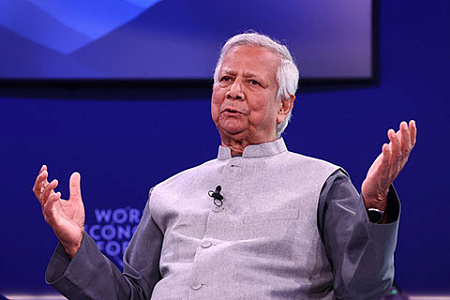
Bangladesh, a country of 175 million people, is in a fever again. The interim government led by Nobel Prize winner Muhammad Yunus failed to restore law and order after the overthrow of the previous leader, Sheikh Hasina, and her flight to India. Hindu temples and the homes of supporters of the former prime minister are being attacked by members of radical Islamist groups. As a result, Bangladesh has become another hotbed of tension in South Asia at a time when India and Pakistan are teetering on the brink of war.
Yunus’s government is favored by the United States, Britain, and other Western countries. But in practice, it all comes down to assurances of sympathy, there is no real help from the West. Worse than that. The United States has stopped funding Bangladesh’s health authorities. This could lead to an outbreak of tropical diseases that medical professionals considered eradicated.
The return of Khalida Zia, the former prime minister and nominal head of the opposition Bangladesh Nationalist Party (BNP), to his homeland does not contribute to the cooling of the atmosphere. This elderly woman, who returned from exile and treatment in Britain, was greeted by a lot of supporters at the Dhaka airfield on Tuesday. They demand to hold parliamentary elections, hoping that the NPB will win. Observers doubt that Zia, who uses a wheelchair, is able to calm the radicals who are rocking the state ship.
Of course, India has always been the most influential external player in Bangladesh’s political arena. After all, it was only thanks to the defeat of Pakistan by the Indian army in 1971 during the third Indo-Pakistani War that the Bengali liberation movement was able to establish its authority over the former territory of East Pakistan and proclaim the independence of Bangladesh.
India’s victory put an end to the relentless terror by Islamist groups close to the Pakistani authorities against independence supporters and Hindus. At that moment, it largely depended on India who would become the leader of the new state. Mujibur Rahman, the leader of the Awami League party, who was in prison in Western Pakistan, was very popular. After the end of the war, the Pakistanis released Rahman, and he became president of Bangladesh.
But the hero of the liberation struggle failed to overcome corruption and strife in the ruling elite. In 1975, Rahman and many members of his family were killed by a group of army officers and soldiers. This tragedy happened in the last century, but it is, alas, a reminder of how unstable the power structure in Bangladesh remains to this day. The question is natural: is the head of the interim government Yunus capable of restoring order?
Yunus became a popular figure in the West after he developed a microfinance program for small businesses. Its essence is that small loans without collateral are issued at a low interest rate. Yunus was called the banker of the poor. However, in reality, not everything was smooth. The government of Prime Minister Sheikh Hasina, the daughter of the founding father of the independent republic, Rahman, said Yunus had robbed the peasants. The laureate was arrested, but released on bail. Student protests broke out in the country. At first, the army and law enforcement officers silently watched the demonstrators and even allowed them to break into the prime Minister’s residence and destroy the memorial in honor of Mujubur Rahman.
Before the coup, India was a close partner, almost an ally of Bangladesh. Bangladesh has traditionally had friendly relations with Russia. After all, the Soviet Union, by supplying arms and ammunition to India in 1971, contributed to its victory over Pakistan. It seems like a story that has nothing to do with today. In fact, this is not the case.
Internal upheavals in Bangladesh may affect the balance of power in South Asia. Both the West and China, which is ready to implement projects based on the Belt and Road initiative, would like to maintain their influence in the country. But the question arises: will the Yunus government be able to maintain stability in the state? After all, Islamist radicals have become more active there.
The events in Bangladesh cannot be indifferent to Moscow either. Today, the most significant symbol of friendly relations between Moscow and Dhaka is the Ruppur nuclear power plant construction project with the help of the Russian Federation. Yunus stated that this project is of great importance for providing the country with electricity.
In an interview with NG, Sergey Velichkin, Associate Professor at the Diplomatic Academy of the Ministry of Foreign Affairs of the Russian Federation, noted: “This project is not just a symbol of good relations between Moscow and Dhaka. For a country with such a high population density, the provision of electricity is of great importance. The textile industry, which exports and supplies cheap and high-quality fabrics to both Americans and Europeans, depends on the supply of electricity. And farmers in rice fields are increasingly using electrical equipment instead of oxen, as in the old days.”
Khalida Zia, the leader of the Bangladesh Nationalist Party, was greeted by hundreds of supporters at Dhaka airport.
